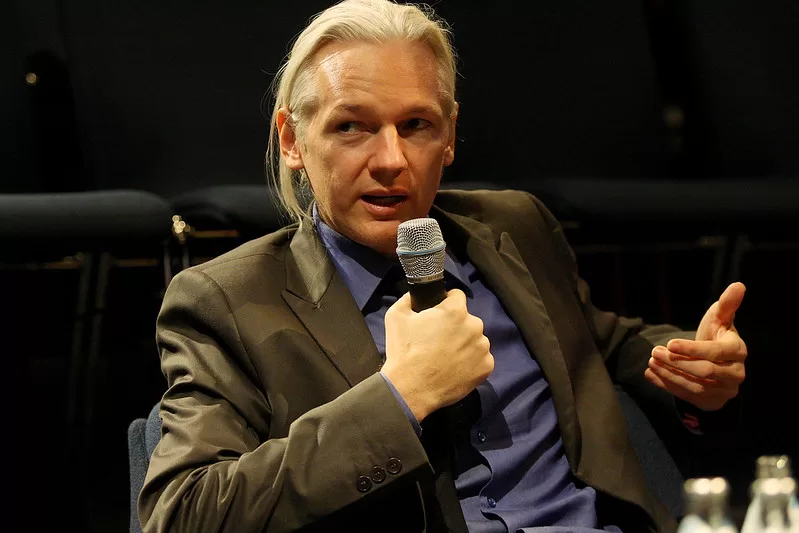I first met Julian Assange before he was Julian Assange. Or rather, when he was just becoming Julian Assange. For a few short months our fates were intertwined. And it all started with Index on Censorship.
In 2008, when I was political editor of the New Statesman, I was asked to collect an Index on Censorship New Media award on behalf of WikiLeaks, the organisation Assange founded two years earlier. I duly turned up for the event and was told the man himself had appeared at the caterers’ entrance at the last-minute and my services would not be required. Secretive and not a little melodramatic, I soon discovered this was the way Assange liked to do business. The speech was impressive, expressing how much Assange valued solidarity and his admiration for “syndicalism”, the belief that direct action can drive political change.
I wrote about that evening in my New Statesman blog and Assange noticed another item, where I discussed the newly aggressive approach the law firm Carter Ruck was taking with one of its clients, Nadhmi Auchi, an Iraqi billionaire convicted of fraud in France as part of the giant Elf-Aquitaine scandal. Mr Auchi continues to deny the charges. Newspapers who had written about Auchi’s business dealings were being threatened with legal action if they didn’t remove articles from their websites. Most of them eventually complied rather than face steep legal bills. Assange acted quickly to hoover up everything he could about Auchi and published it on WikiLeaks. It was a bold move because Carter Ruck were playing hardball. When I published a link to the Auchi files on my blog, the law firm threatened to sue the New Statesman.
I recently came across an email from Assange which he sent in November 2008, when he found out the New Statesman was planning to cave. He condemned the magazine for removing the original blogpost and objected to plans to issue a statement saying the articles collected by WikiLeaks (and published by respected journalists in national newspapers) contained significant inaccuracies. He pointed out that this action would in itself be defamatory.
This was solidarity and syndicalism, Assange-style. The New Statesman decided to settle with the billionaire, and I soon parted company with the magazine.
A few months later, a WikiLeaks emissary walked into the offices of a charity I had set up to help young people break into the creative industries on London’s Southbank. He showed me footage of the 12 July 2007 Baghdad airstrike in which two Reuters journalists and several civilians were killed by a missile from a US helicopter. After a few further discussions, I advised him to talk to major news outlets about this extraordinary story. Shortly after this, WikiLeaks (in collaboration with The Guardian, The New York Times, Le Monde, Der Spiegel and El Pais) began publishing the US diplomatic cables that made Assange’s reputation. It was a new, collaborative way of doing journalism that challenged the way the United States conducted foreign policy. Solidarity and syndicalism in action, perhaps.
We live in different times and Julian Assange finds himself in Belmarsh high-security prison awaiting the result of his final appeal against extradition to the United States, where he faces trial under the Espionage Act. In the interim, he has become a highly divisive figure and much of the solidarity from his former journalistic collaborators has evaporated. He has made serious errors of judgment and attracted some unfortunate allies. His radar for what constitutes genuine dissent has always been questionable. As former Index journalist Padraig Reidy pointed out in an important piece on Assange in BuzzFeed News in 2019: “Assange’s definition of ‘power’ and ‘elite’ often stretched only as far as Western governments and their allies.” Over the years, it has sometimes seemed that the principles of solidarity only worked in one direction. With each new twist in the story, a new layer of support dropped away. When Assange jumped bail and found refuge in London’s Ecuadorian embassy, when he published hacked emails from Hilary Clinton’s 2016 election campaign, when he suggested he was the victim of a conspiracy of Jewish journalists and was found to have employed a Holocaust denier, this all contributed to the picture of Assange as a narcissistic, paranoid self-publicist whose path was littered with the collateral damage of his overblown ego.
The question is whether it is possible to set all this aside and look at the bigger picture or if Assange’s flaws and failings are an integral part of the bigger picture. Meanwhile, those journalists who have worked with him over the years need to ask themselves if his present predicament as a prisoner in the UK’s highest security prison is just desserts or a travesty of justice.
The French free expression organisation, Reporters Without Borders, which has been consistent in its support for Assange, published a useful list of common misconceptions in the Assange case: that he is a traitor to the United States (he is Australian), that he leaked classified information (he published it), that he knowingly put people at risk (the prosecution has struggled to prove harm). But most powerful is the misconception that if he is convicted this will have no wider effect. There is already ample evidence that governments are determined to deter journalists from ever working with the likes of Assange again. The new UK National Security Act has specific measures to increase sentences for journalists working on data leak stories involving official secrets. Add to this the use of the US Espionage Act. Assange would be the first publisher tried under this act and if convicted he might not be the last.
Julian Assange is so wrong about so much. He has made many terrible mistakes. He is, in some ways, the agent of his own misfortune. But he taught journalists that some stories are so important that they need international collaboration to put them into the public domain. He was not wrong about the importance of solidarity.






